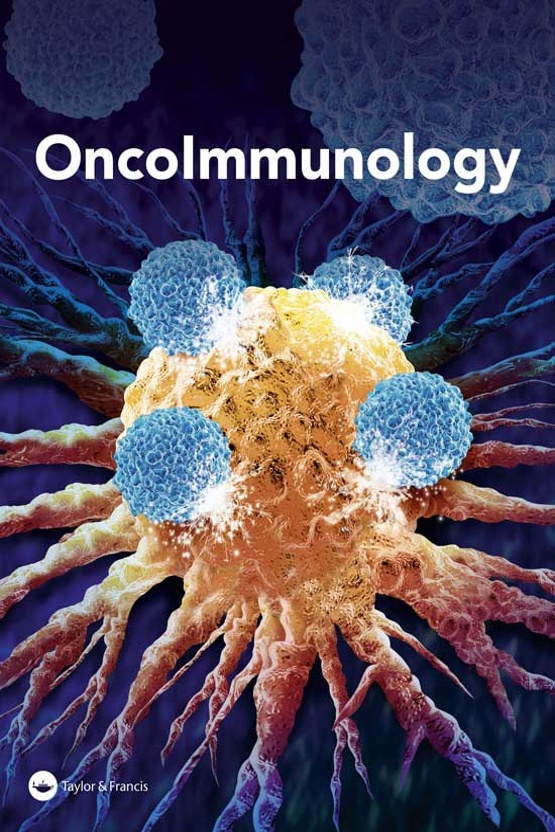Submit a Manuscript to the Journal
OncoImmunology
For an Article Collection on
Role of the Tumour Microenvironment in Modulating the Immune Responses to Cancer
Manuscript deadline
30 September 2024


Article collection guest advisor(s)
Dr. Vadim Sumbayev,
Universities of Kent and Greenwich
[email protected]
Dr. Kamiya Mehla,
University of Oklahoma Health Science Centre (OUHSC)
[email protected]
Role of the Tumour Microenvironment in Modulating the Immune Responses to Cancer
Malignant transformation of human cells and growth of malignant tumours is associated with the activation of immunosuppressive biochemical pathways, which allows them to escape host immune surveillance. The process of tumour growth is associated with the development of so-called tumour microenvironment (TME). This is the environment around a tumour, which normally includes blood vessels supplying the tumour with oxygen and nutrients as well as immune cells infiltrating into and approach the tumour, tumour-associate fibroblasts, signalling molecules (mainly proteins and small molecular weight compounds) and extracellular matrix. Tumour and TME are in constant interaction with each other and the TME tends to modulate a complex of immune reactions to the tumour known as anti-tumour immunity or anti-cancer immunity. However, malignant tumours are operating complex pathways forming immune evasion machinery which suppresses anti-cancer immunity and also “re-programme” the TME cells to support tumour growth and cancer progression.
Understanding the mechanisms underlying the ability of TME to modulate anti-cancer immune responses and the immune evasion machinery employed by tumours to suppress them is vitally important since it will allow us to develop efficient strategies for targeted personalised immunotherapy of cancer. Therefore, we are inviting manuscripts that focus on the mechanisms operated by TME to modulate anti-cancer immune responses. We also look forward to receiving submissions focused on immune evasion machinery which triggers the TME cells to support tumour growth and evade/suppress anti-cancer immunity. In addition, we will consider contributions dealing with the development of novel strategies or approaches to anti-cancer immunotherapy as well as identification of new therapeutic targets based on understanding the interactions between tumours and their TMEs.
We will welcome research articles, reviews and mini-reviews, case reports, clinical trials and short communications dealing with subjects outlined above.
All manuscripts submitted to this Article Collection will undergo a full peer-review; the Guest Advisor for this collection will not be handling the manuscripts (unless they are an Editorial Board member). Please review the journal scope and author submission instructions prior to submitting a manuscript.
The deadline for submitting manuscripts is 30 September 2024.
Please contact Zhan Yu at [email protected] with any queries and discount codes regarding this Article Collection.
Please be sure to select the "Role of the Tumour Microenvironment in Modulating the Immune Responses to Cancer" from the drop-down menu in the submission system.
Dr. Vadim Sumbayev obtained his PhD degree in Biochemistry in 1999 at Palladin Institute of Biochemistry NAS, Ukraine. He then joined the Department of Biochemistry, Mechnikov Odessa National University as an Assistant Professor. In 2001, he obtained a highly competitive Humboldt Research Fellowship completed at the University of Kaiserslautern, Germany. Upon completion of his fellowship Dr Sumbayev spent three years in Aarhus (Denmark) working as an Assistant Professor at the Interdisciplinary Nanoscience Centre, University of Aarhus. In 2006, Dr Sumbayev joined Medway School of Pharmacy (Universities of Kent and Greenwich, United Kingdom) and is currently working there as Associate Professor of Biochemistry and Director of Research and Innovation.
Dr. Kamiya Mehla did her Ph.D. at the Institute of Genomics and Integrative Biology, Delhi. She next did her postdoctoral training at the University of Nebraska Medical Centre (UNMC) and later, joined OUHSC at the Department of Oncology Sciences in 2022 as an associate professor. Her investigations currently focus on deciphering novel tumor and immune cell cross-talk at the primary tumor and distant systemic sites, including spleen and muscle. Dr. Mehla’s lab also interrogates the contribution of immune cell-mediated muscle atrophy in PDAC patients.
Benefits of publishing open access within Taylor & Francis
Global marketing and publicity, ensuring your research reaches the people you want it to.
Article Collections bring together the latest research on hot topics from influential researchers across the globe.
Rigorous peer review for every open access article.
Rapid online publication allowing you to share your work quickly.
Looking to Publish your Research?
Find out how to publish your research open access with Taylor & Francis Group.
Choose open accessSubmission Instructions
All manuscripts submitted to this Article Collection will undergo desk assessment and peer-review as part of our standard editorial process. Guest Advisors for this collection will not be involved in peer-reviewing manuscripts unless they are an existing member of the Editorial Board. Please review the journal Aims and Scope and author submission instructions prior to submitting a manuscript.